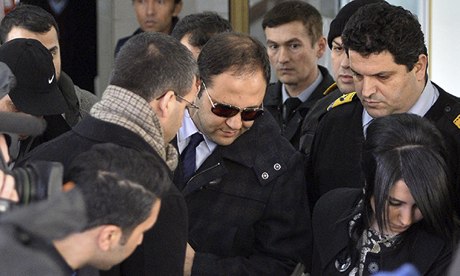Turkish police have arrested the sons of three cabinet ministers and at least 34 others in orchestrated raids that appeared to represent the biggest assault on the authority of the prime minister, Recep Tayyip Erdoğan, since mass protests against his rule last summer.
The detentions went to the heart of the Erdoğan administration and included leading businessmen known to be close to the government and officials said to be engaged in suspected corruption, bribery and tender-rigging.
While no official statements have yet been made, Turkish analysts saw the surprise wave of arrests as a strong sign of the worsening conflict between the Erdoğan government and his former allies, a movement of moderate Islamists lead by exiled cleric Fethullah Gülen.
According to Turkish media reports, the sons of the interior minister, the economics minister and the environment and city planning minister were among those detained. Other detainees included the head of the state-controlled Halkbank, the mayor of an Istanbul district considered to be a stronghold of the ruling AK party as well as the three construction sector tycoons, Ali Agaoglu, Osman Agca and Emrullah Turanli. Agaoglu has recently made headlines with controversial mega-projects and works for the notoriously opaque state housing agency (Toki).
Prosecutors and police were not available for comment.
The dawn raids were launched following a year-long investigation into allegations of rigging state tenders and bribery and were undertaken without Erdoğan’s knowledge, signalling a considerable blow to the authority of the increasingly authoritarian prime minister, the Turkish daily Hürriyet said.
“The [arrests] target the softest spot of the current political and business elite, construction and corruption,” sociologist and urban researcher Yasar Adanali said. “We have a very liberal legal environment for investment in Turkey. It does not come as a surprise that such deals in real estate or gold trade were happening. But what is a surprise is that such an operation is possible.”
Erdoğan declined to comment on the corruption arrests, citing the ongoing investigation. However speaking at an opening ceremony in the city of Konya, he blamed what he called “dark circles”.
“They can use whatever ugly methods they like or turn to dirty alliances, but we will not bow to any threats,” Erdoğan said. “Neither the nation nor we will give permission to those who seek to settle their scores outside the ballot box. Turkey is not a banana republic.”
The arrests sent a shockwave through the ranks of the government just months before a crucial election year starting with local polls in March.
“The [AKP’s] election campaigns are all based on mega-construction projects and relentless development that suggest that Turkey is steadily growing, that everyone is getting richer,” Adanali said. “So that the same government is now being accused of having established a system of corruption in these very sectors is the worst damage possible prior to the elections.”
Many commentators speculated that the high-profile operation may have come on the back of an increasingly heated feud between the AKP government and the moderately Islamist Gülen movement named after its leader, Fethullah Gülen. Critics of the group allege that Gülenists wield considerable influence over Turkish state institutions, especially in the judiciary, the police, and the secret security sectors.
At the start of Erdoğan’s 11-year-long rule, the Gülen movement was an important ally in reining in the military and the dominant, military-backed secular elite, but the union between the two factions of Erdoğan’s conservative power base has since turned sour.
Tension increased last month when Erdoğan announced plans to close down or transform prep-schools owned by the Gülen movement, thus depriving them of millions in revenue and a powerful and influential recruitment network. Two AK MPs have since left the party over the row, one of whom was former footballer Hakan Sükür, who announced his resignation on Monday.
Turkish media reported that one of the prosecutors involved in the corruption probe is Zekeriya Öz who headed the so-called Ergenekon case, an investigation supported by the Gülen movement into an alleged coup plot.
Hüseyin Gülerce, a commentator for the Gülenist daily Zaman known to be closely affiliated with the movement, refuted the allegations that Hizmet, as the movement is known in Turkey, was behind the arrests.
“Some are trying to manipulate the ongoing operation by pointing at the Hizmet movement,” he tweeted. “This operation is a state operation. Instead of asking which state, one should look at what happened after the Gezi protests.”
This article originally appeared on theguardian







